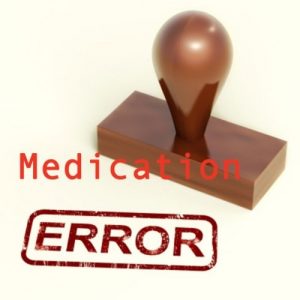7.1. Medication errors
 Knowing the following before administering medications will help prevent medication errors:
Knowing the following before administering medications will help prevent medication errors:
- Name (generic and trade);
- Purpose;
- Effect;
- Length of time to take effect;
- Side effects;
- Adverse effects;
- Interactions;
- Special instructions;
- Where to get help;
- Six rights of medication.
A medication error occurs when
1. One of the “six client rights” has been violated.
- Administering wrong medication
- Administering wrong dose of medication
- Administering medication at the wrong time Medications may be administered per agency policy prior or per agency policy past the time ordered, and still be considered to be on time.
- Administering the medication in the wrong route (i.e. dermatological ointment administered to eye).
- Administering medication to wrong individual.
- Failing to document medication was given or inaccurate documentation of medicine give.
2. Staff
- Failure to comply with physician orders, failure to administer only upon current orders or occurs when the administration of a medication is not as prescribed by the doctor or prescribing practitioner; when a medication is administered in any way other than how it was prescribed. (Medication administered contrary to a physician’s order that either causes or has the potential to cause harm to the recipient.).
- Does not follow manufacturer’s directions.
- Does not follow accepted standards for medication administration.
- Failure to accurately transcribe a MAR.
- Improper documentation on MAR.
- Failure to accurately label a MRB.
- Improper medication storage.
- Running out of medications.
- Crushing a medication that shouldn’t be crushed
Medication error procedures:
- Immediately document details of the error on the MAR. Example: Giving the wrong client the wrong medication: Initial the appropriate date box, circle the initials, document the exact reason on the reverse side (or other designated area) of the MAR, and contact the appropriate person according to facility policy.
- Immediately notify the supervisor and physician. Follow agency policy to notify appropriate professionals
- Know and follow your facility’s policy for medication errors. Complete a medication error report in accordance with regulations and agency policies. The non-licensed personnel has the responsibility to ALWAYS follow agency policy and procedure to report if they have any reason to believe they have made a medication error. This should be reported as soon as possible.
- It is in regulation that medication errors are required to be reported to the licensing agency (Medicaid or CDPHE) within one business day.
- QMAP has been counseled about similar neglect in the previous 12 months and had been counseled and/or re-educated. Or the QMAP intentionally failed to follow the standard of practice or the facility’s policy with significant potential for harm or harm.
Considerations in determining if a medication error occurred:
- Medication error resulting in medical treatment.
- Medication error resulting in harm or the potential to cause harm.
Medication errors may result in adverse reactions to the individual. These reactions could range from a rash to death.